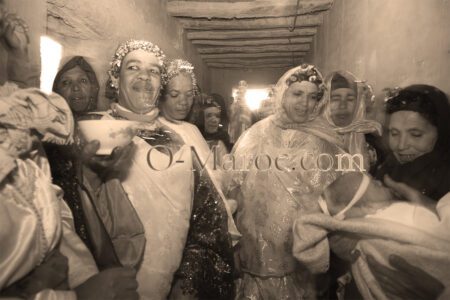There are many Gs in Amazigh, a letter that does not exist in classical Arabic. Morocco uses the Kaf with three dots above it to represent them.
All posts about Amazigh
According to the 2024 census and the Sunergia study, 25% of Moroccans speak Berber. However, very few write it, at least using the Tifinagh script.
A foreigner married into a Berber family is suddenly given the gift of understanding Amazigh. Is this a blessing?
In spite of being an official language in Morocco, Amazigh is not used in the administration and professional world. You can learn it, of course, but it's not as important as Arabic and French.
An educational magazine is publishing a special issue on Morocco, but its article on Moroccan languages is full of inaccuracies and fails to reflect the country's complex reality.
The goat that flies with its tuft of grass between its teeth, an Amazigh proverb known to all, the local substitute for the Milka marmot.
There are few translations of sardine in Amazigh; it's called sardine or fish. What if "sardine" was a Berber word?
Tafaska (Eid Al Adha in Amazigh) is celebrated throughout Morocco, "in the boondocks" (bled), in accordance with tradition.
Mediterranean languages have been mixing for a very long time, what Louis-Jean Calvet calls "mixed languages", with examples from Antiquity to the present day.
Morocco is Berber, even though many Berbers no longer speak Amazigh. And for good reason, despite real efforts, the Berber language is not really supported in Morocco.
As in French, fireplace or foyer (almessi) defines the family. The oven (afarnou) gives its name to a much sought-after bread in Morocco, which every Berber housewife knows how to prepare!
There are many Amazigh words for rivers, streams and watercourses, no doubt to better appreciate this rare resource that is so essential to nomadic pastoralists!
Tizi means mountain pass. A mountainous country, with its three Atlas mountains, Morocco offers visitors many vertiginous tizi, the best known of which are between Marrakesh and Ouarzazate, on the one hand, and Taroudant on the other.
Curiously, the word Anougoud, widely used in Morocco, does not exist in the Ircam dictionary. It refers to the sheep that will be sacrificed for Eid el Adha.
The Berber house is most often built of earth and is square in shape, or fortified, like a kasbah. In some Berber towns, such as Azrou or Ifrane, there are "European" houses.
Amazigh culture is in a minority in Morocco, but it is widespread throughout the population. Supported by the IRCAM, taught - to some extent - in schools, it is being modernised in order to survive.
















